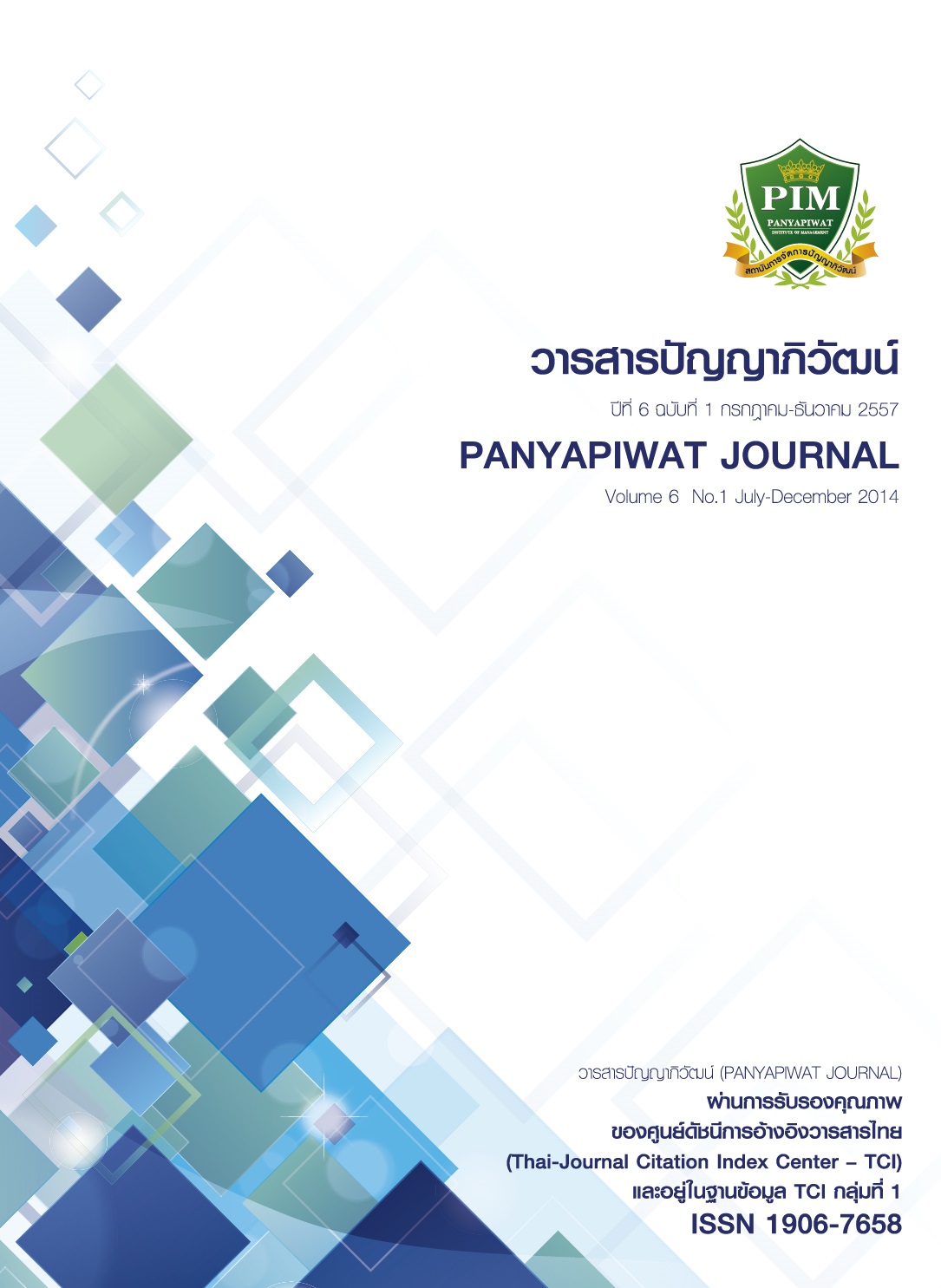STUDENTS’ AND INSTRUCTORS’ PERCEPTIONS OF STUDENTS’ DIFFICULTIES IN WRITING ACADEMIC ASSIGNMENTS
Main Article Content
บทคัดย่อ
Abstract
The purpose of this study is to investigate the students’ and instructors’ perceptions of graduate students’ difficulties in writing academic assignments. The subjects involved in this study consisted of two groups. The first group was twenty-seven MA participants who were studying for their Master Degrees in Applied Linguistics for English Language Teaching at the School of Liberal Arts, King Mongkut’s University of Technology Thonburi (KMUTT). They were still working on their
coursework and had not started writing their thesis. This group comprised both first year and second year students of weekday and weekend programmes. The second group consisted of five instructors teaching these students in the MA programme.
The research instruments used for data collection were a questionnaire and a semistructured interview. The questionnaire was used to identify the difficulties of MA participants in writing their assignments. It was used with the first group of subjects. The semi-structured interview was conducted with five instructors of the MA programme in order to find out their criteria when evaluating students’ assignments and their opinions about students’ difficulties in writing academic assignments. Then, the data collected was analyzed. The results of the questionnaire were classified and calculated in percentage and mean (X) and the instructors’ answers were categorized under the same theme by numbering of respondents.
Both groups of subjects revealed that MA participants had difficulties with the content of the task, writing skills, language usage and thinking skills. Nevertheless, each group of subjects focuses on the different areas of difficulties in writing academic assignments. The results of the study imply that the students need both methodological and psychological preparation to enable them to cope with academic writing at a satisfactory level.
บทคัดย่อ
งานศึกษานี้มีวัตถุประสงค์เพื่อสำรวจความคิดเห็นของนักศึกษาและอาจารย์ เกี่ยวกับปัญหาในการเขียนเชิงวิชาการของนักศึกษา กลุ่มตัวอย่างแรกในการศึกษานี้ คือ นักศึกษาระดับปริญญาโทจำนวน 27 คน ในสาขาภาษาศาสตร์ประยุกต์ด้านการสอนภาษาอังกฤษของคณะศิลปศาสตร์ มหาวิทยาลัยเทคโนโลยีพระจอมเกล้าธนบุรี
ซึ่งกำลังศึกษารายวิชาต่างๆ ในระดับบัณฑิตศึกษา และยังไม่เริ่มดเนินการทำวิทยานิพนธ์ ทั้งชั้นปีที่ 1 และปีที่ 2ในกลุ่มที่เรียนภาคปกติและภาคพิเศษ กลุ่มตัวอย่างที่สอง คือ อาจารย์ 5 คน ที่สอนในระดับบัณฑิตศึกษาของคณะศิลปศาสตร์ มหาวิทยาลัยเทคโนโลยีธนบุรี ซึ่งเป็นผู้ประเมินงานเขียนและให้คะแนนงานของนักศึกษา
เครื่องมือที่ใช้ในการเก็บข้อมูลในการวิจัยนี้ คือ แบบสอบถามและการสัมภาษณ์แบบสอบถามใช้กับนักศึกษาส่วนการสัมภาษณ์ใช้กับอาจารย์ผู้สอนนักศึกษา ข้อมูลที่ได้แสดงว่านักศึกษามีปัญหาสี่ข้อหลัก คือ ปัญหาด้านเนื้อหาสาระของงาน ปัญหาด้านทักษะการเขียน ปัญหาด้านการใช้ภาษา และปัญหาด้านทักษะในการคิด จากนั้นข้อมูลที่ได้
จากแบบสอบถามและการสัมภาษณ์จะนำมาวิเคราะห์เป็นอัตราร้อยละและค่าเฉลี่ยในรูปแบบที่มีสาระสำคัญเดียวกันอย่างไรก็ตาม กลุ่มตัวอย่างแต่ละกลุ่มให้ความสำคัญกับประเด็นย่อยในบางปัญหาแตกต่างกัน ผลการศึกษานี้บ่งชี้ว่าควรมีการเตรียมผ้เู รียนให้พร้อมสำ หรับการเขียน เช่น วิชาการทั้งด้านวิธีการและด้านจิตใจ เพื่อให้ผ้เู รียนสามารถเขียนงานวิชาการได้ในระดับที่น่าพึงพอใจ
Article Details
“ข้าพเจ้าและผู้เขียนร่วม (ถ้ามี) ขอรับรองว่า บทความที่เสนอมานี้ยังไม่เคยได้รับการตีพิมพ์และไม่ได้อยู่ระหว่างกระบวนการพิจารณาลงตีพิมพ์ในวารสารหรือแหล่งเผยแพร่อื่นใด ข้าพเจ้าและผู้เขียนร่วมยอมรับหลักเกณฑ์การพิจารณาต้นฉบับ ทั้งยินยอมให้กองบรรณาธิการมีสิทธิ์พิจารณาและตรวจแก้ต้นฉบับได้ตามที่เห็นสมควร พร้อมนี้ขอมอบลิขสิทธิ์บทความที่ได้รับการตีพิมพ์ให้แก่สถาบันการจัดการปัญญาภิวัฒน์หากมีการฟ้องร้องเรื่องการละเมิดลิขสิทธิ์เกี่ยวกับภาพ กราฟ ข้อความส่วนใดส่วนหนึ่งและ/หรือข้อคิดเห็นที่ปรากฏในบทความข้าพเจ้าและผู้เขียนร่วมยินยอมรับผิดชอบแต่เพียงฝ่ายเดียว”
References
Canagarajah, A., S. (2002). Critical Academic Writing and Multilingual Students. Michigan: The University of Michigan Press.
Chapelle, C., A. & Hunston, S. (2001). Learning Vocabulary in Another Language. I.S.P. Nation, Cambridge, Cambridge University Press.
Dees, R. (2003). Writing the Modern Research Paper. USA: Longman.Enkvist, N. (1990). Coherence in Writing, Teacher of English to Speakers of Other Languages. Alexandria.
Grabe, W. & Kaplan, B., R. (1996). Theory and Practice of Writing. An Applied Linguistic Perspective. Teaching writing at beginning levels. New York: Longman.
Harris, J. (1993). Introducing Writing, England: Penguin Group.
Hedge, T. (2000). Teaching and Learning in the Language Classroom. Oxford: Oxford University Press..
Hyland, K. (2003). Second Language Writing. New York: Cambridge University Press.
Leki, I. (1998). Academic Writing, Exploring Processes and Strategies. New York: Cambridge University Press.
Murcia, M, C., & Olshtain, E. (2000). Discourse And Context In Language Teaching. A Guide for Language Teachers. Cambridge: Cambridge University Press.
McWhorter, K., T. (1988). Study and Thinking Skills in College. Boston: Foresman and Company. Nuttall, C. (1996). Teaching Reading Skills in a foreign language. Hong Kong: Macmillan Publishers Limited.
Pappas, C. C., Kiefer, B. Z. & Levstik. (1995). An Integrated Language Perspective in The ElementarySchool. New York: Longman Publishers.
Palmer, B. C., Hafner, M. L., & Sharp, M. F. (1994). Developing Cultural Literacy Through the Writing Process. Boston: Paramount Publishing.
Reid, S. (2000). The Prentice Hall Guide For College Writers. New Jersey: Prentice Hall.
Richards, J., C., Platt, J. & Platt, H. (1992). Longman Dictionary of Language Teaching Applied Linguistics. UK: Longman.
Tribble, C. (1996). Writing. Oxford:Oxford University Press.
Williams, M. & Burden, R. L. (1997). Psychology for Language Teachers: a Social Constructivist Approach. Cambridge: Cambridge University Press.

